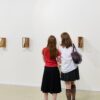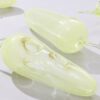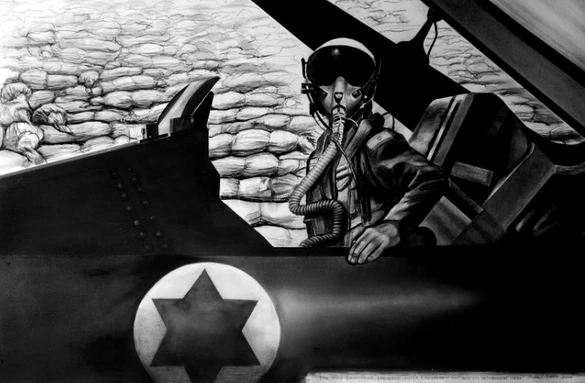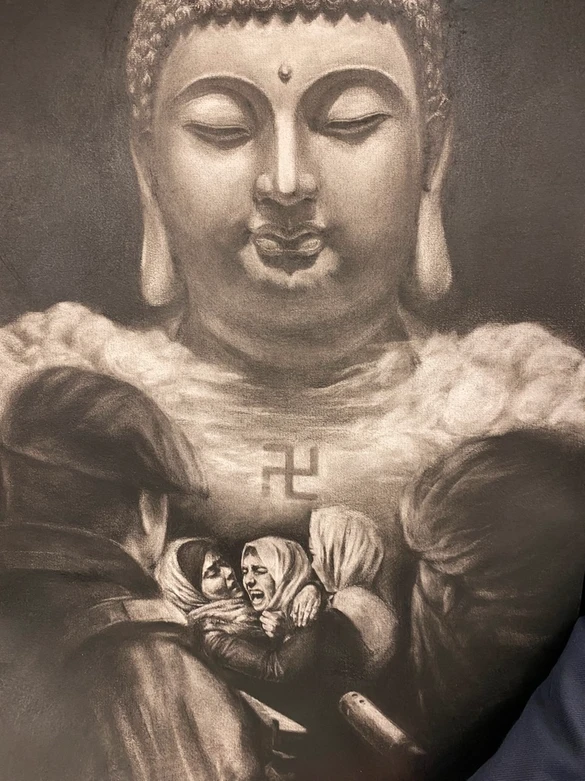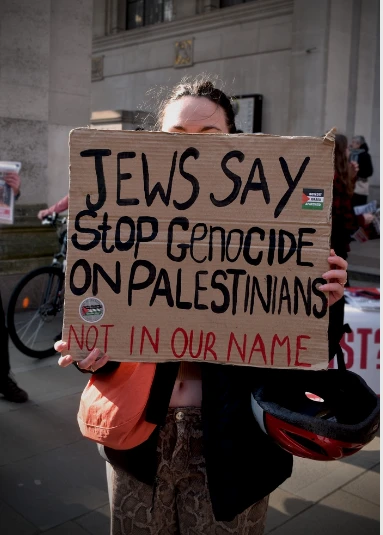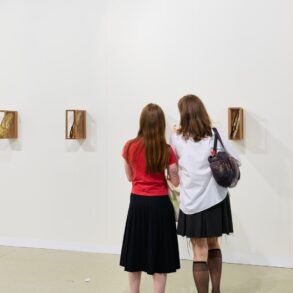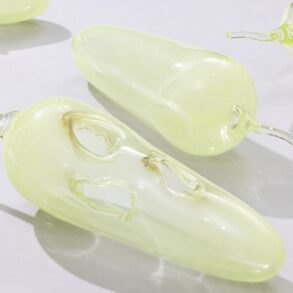The Royal Academy Art (RA) has removed two Gaza war-related artworks from its summer exhibitions following outrage from Jewish leaders, although one incendiary piece remains on display.
The RA was criticised for three pieces which included one featuring a swastika looming over screaming Gazan women and another that depicts a faceless Jewish pilot against a backdrop of bodybags.
On Monday the Board of Deputies expressed “significant concern” over the artworks and demanded that the RA reconsider its display – on Tuesday, two of the works were removed.
One piece, titled “The Mass Slaughter of Defenceless Women & Children Is Not How You Deradicalise Gaza” by Michael Sandle, features a faceless pilot in an aircraft with a Star of David symbol front and centre against a backdrop of body bags. It remains on display and is listed on the RA website for sale at £17,000.
Michael Sandle’s artwork called “THE MASS SLAUGHTER OF DEFENCELESS WOMEN & CHILDREN IS NOT HOW YOU DERADICALISE GAZA” remains on display (Photo: RA)
The two removed pieces include “Conflict”, produced by a 16-year-old artist named Andy and displayed in the RA’s Young Artists’ Summer Show, uses a swastika as a symbol for an Israel that looms large over women huddled together and screaming. The Nazi symbol hangs in mid-air underneath a large Buddha.
In a piece titled ‘Conflict’ by Andy, 16, the teenage artist depicts a large Buddha with a swastika over the heads of three screaming women. The artist said in his caption: “Watching the conflict unravel in Gaza draws many parallels with the Nazi’s and Chinese oppression, hence the Buddha symbol and the swastika.”
The artist said: “Watching the conflict unravel in Gaza draws many parallels with the Nazis’ and Chinese oppression, hence the Buddha symbol and the swastika.”
According to the caption, Andy “created this piece of work inspired by the recent conflict in Gaza”.
A third piece by an 18-year-old named Kausar also in in the Young Artists’ show depicts an individual hiding behind a sign reading “Jews say stop genocide on Palestinians: Not in Our Name”. This was also removed.
The gallery said: “We feel that by continuing to display these artworks, with limited opportunity to provide context or discourse, we would risk causing undue upset and could put people at risk.”
One parent whose son’s artwork is featured in the Young Artists’ Summer Show told the JC that he no longer feels comfortable taking his son to the RA: “He was so excited to win a place in the gallery and can’t wait to see it on display. But I am put off taking him as I don’t want him to see it knowing that he will also come face to face with images of Jewish hate for him.
“I’m already scared to allow my children to let others know they are Jewish. And seeing antisemitism so blatantly ignored and instead rewarded and put on display in such a respectable and highly regarded British institution, makes me worry about their future,” the father said.”
The Board of Deputies questioned the gallery’s “judgement” in allowing these works into the show. The BoD condemned hanging the works, “with no attempt to present any context or contextualising works which might express a contrary view.”
“It risks giving the impression that the RA is taking a political stance on a very controversial issue, which would seem at odds with its objectives, not to mention its charitable status,” the BoD said.
In a letter to the chief executive of the RA, Axel Rüger, the vice president of the BoD, Andrew Gilbert, said: “while we are sure this was not the intention of the artists, some imagery and content relating to works mentioned above comprise antisemitic tropes and messaging as defined by the International Holocaust Remembrance Alliance (IHRA) definition of antisemitism.”
A spokesperson for the RA said: “The Royal Academy’s sixth annual Young Artists’ Summer Show, opening on Tuesday 16 July, displays a selection of works by young artists aged from 4 to19 from across the UK, selected by a panel of judges including Royal Academicians and RA Schools students. This year, there are more than 300 works on site and over 500 works online, selected from over 21,500 entries. Since the RA’s foundation in 1768, art education has been at its heart. The Young Artists’ Summer Show provides a platform for the skilled and varied work of students, champions the importance of art in education and celebrates the teachers fostering creativity in young people. As an organisation committed to freedom of expression, works in the exhibition often reflect current societal and political topics that matter to young people, from women’s rights to global conflict.
“We are aware of concerns about two artworks that relate to the Israel/Palestine conflict. We have discussed the matter thoroughly and have also received external guidance. We recognise that an exhibition for young people and artwork by young people is not an appropriate environment for volatile public discourse. We offer a duty of care to the artists we exhibit and the visitors to our galleries, particularly our youngest and most vulnerable. We chose to include these works in the show. However, having reviewed and considered the matter carefully, we feel that by continuing to display these artworks, with limited opportunity to provide context or discourse, we would risk causing undue upset and could put people at risk. We have therefore made the decision to remove these two artworks from display. We apologise for any hurt and distress this has caused to our young artists and to our visitors. We will learn from this experience and we are reviewing our processes, so we can continue to celebrate the creativity of young artists in a safe and responsible way.”
This post was originally published on this site be sure to check out more of their content

